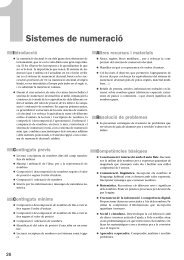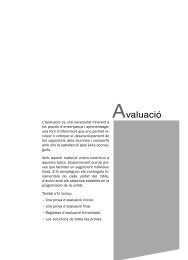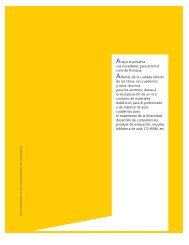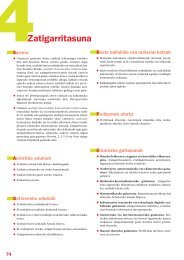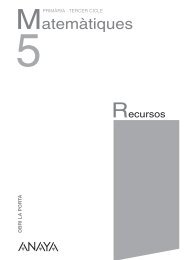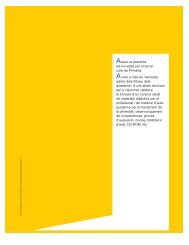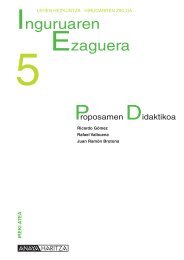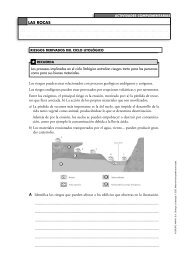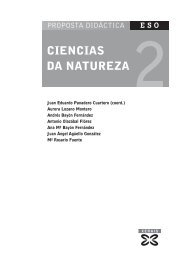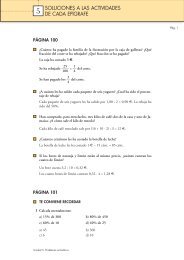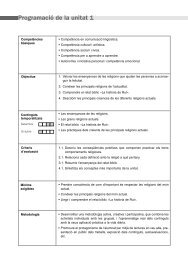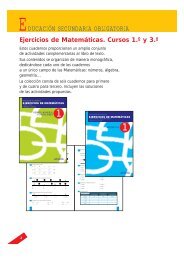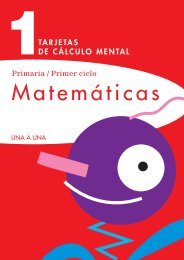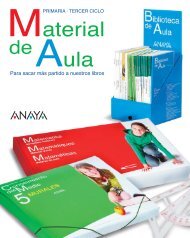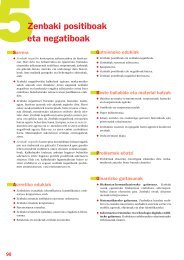Objectives
Objectives
Objectives
- No tags were found...
Create successful ePaper yourself
Turn your PDF publications into a flip-book with our unique Google optimized e-Paper software.
UNIT 1 SYLLABUS<strong>Objectives</strong>1. To recognise familiar vocabulary and toincrease the students’ word list with newwords and phrases.2. To use the target language orally and in thewritten form.3. To extract information from recordings in orderto be able to answer questions and completegapped texts.4. To be able to identify the word stress andpronounce words with the correctpronunciation and intonation.5. To identify the topic of a text before readingand share ideas with the class.6. To achieve an acceptable level ofunderstanding when reading texts which coverboth general and specific understanding.7. To plan and write an article based on a model,using the target vocabulary and language.8. To use different resources in order to obtaininformation and present it as a project eitherindividually or in groups.9. To reflect upon the meaning and appropriateuse of grammatical structures depending onthe requirements of each situation.10. To use ICT resources to achieve information,which they later share with the rest of the class.11. To encourage interest in and comparisonbetween events in an English speakingcountry and the students’ own countries usingEnglish.Evaluation Criteria1.1. Uses previously acquired vocabulary todescribe people and learns new expressionsand adjectives to describe fashion and style.1.2. Can talk about free time activities andinterview a peer, using the target language.2.1. Is able to plan a weekend of activities usingthe target language and present theinformation as a dialogue, both spoken andwritten.2.2. Reviews the uses of the present simple andpresent continuous in short dialogues.3.1. Can understand key information and completea text.3.2. Is able to follow a conversation betweenfriends and put the sentences in order.4.1. Can listen to and repeat the target language ofexpressing preferences using the correctintonation and pronunciation.5.1. Can identify the topic of an interview usingvisual prompts and shares his or her ideas withthe class before reading to check answers.6.1. Is capable of reading a text about FashionTribes and answering comprehensionquestions using previously acquired languageand understanding new language in context.7.1. Can write an article about inspirational peopleusing the model and the planning exercises inthe book.7.2. Is able to present the information in theappropriate form of an article using headingsand clear paragraphs.8.1. Participates in class interviews about fashionand uses his or her findings to write a shortsummary.9.1. Is able to identify the different uses of thepresent simple and the present continuous.9.2. Can use relative pronouns and adverbs tocomplete sentences in a text.10.1. Uses ICT to investigate the history behindsome famous fashion styles of the past.11.1. Reads about teenagers in New York andIreland and compares them to teenagers in hisor her own country.
Contents■ Speaking and comprehension• Speaking and conversation– Talking about fashion, describing people inphotos.– Dialogues to review uses of present simpleand present continuous.– Interviews using the text in the book as a model.– Planning a weekend for visitors usingpicture prompts and target language.• Listening– Completing an advertisement with specificinformation.– Ordering a conversation between friendsabout a weekend activity.– Completing a leaflet about summer courseswith specific information.• Phonetics and sounds– Activities to practise pronunciation and touse the correct intonation and appropriaterhythm when making suggestions andstating preferences.■ Reading and writing• Reading– Reading and comprehension questionsbased on fashion tribes.– An interview with a teenager and a clozeactivity.– Development of reading for personalenrichment.• Writing– Summarising the results of a question andanswers pairwork activity.– A dialogue between friends planning aweekend of activities, using the targetlanguage and the model from the text.– An article about inspirational people,focusing on paragraph structure and theuse of headings.■ Knowledge of the language and reflection• Grammar– Review of present simple and presentcontinuous.– Review of relative pronouns and adverbs.• Vocabulary and Phonetics– Clothes related vocabulary, adjectivesdescribing clothes, free time activities,suggestions and preferences, likes anddislikes.– Intonation and pronunciation.• ICT investigation– Using the Internet to find out about somefamous fashion styles from the past.• Reflection on the learning process– Model plans to organise work and improvelearning.– Study skills to help organise and rememberkey information and grammar points.– Pair and group work activities.■ Socio-cultural aspects• Culture– Informative text and cloze activity aboutteenagers’ free time activities in twoEnglish speaking countries.– Activity to encourage students to comparethe free time activities of teenagers in theircountry with the English speaking countriesfrom the text.Competencies• Competency in linguistic communication• Competency in learning to learn• Competency in ICT and processing information• Competency in artistic and cultural aspects• Competency in autonomous learning• Competency in social awareness and citizenship
UNIT 2 SYLLABUS<strong>Objectives</strong>1. To use the target language orally and in thewritten form.2. To identify, use and understand the targetvocabulary and structures correctly.3. To predict and understand information fromlistening activities.4. To identify the speaker in recordings andcategorise the given information.5. To identify words, expressions and basicstructures in a predictable situation despitenot understanding the complete message.6. To plan and write different types of texts basedon models, using the target vocabulary andlanguage.7. To read an extract paying attention to aspecific grammatical structure.8. To identify, learn and use the grammar rulesand structures correctly.9. To identify and pronounce correctly thephonetic sounds // and /eI/.10. To develop a positive attitude towards Englishand appreciate the importance of autonomouslearning and self-evaluation.11. To use and develop learning strategies andICT resources to gain and present information.12. To learn to show interest in the world aroundus using English and to encourage a positiveattitude towards others.Evaluation Criteria1.1. Can discuss the advantages anddisadvantages of public transport using thetarget language.1.2. Is able to produce a dialogue set in a trainstation using the model and target language.2.1. Participates in a chain story using timeadverbials, an appropriate past tense, and hisor her own ideas.3.1. Predicts the topic of a story based on soundsand pictures.4.1. Listens to travel announcements and identifieswhere the announcements take place.5.1. Can put a conversation held in a train stationin the correct order.5.2. Is able to order a story using his or herpreviously acquired language skills andunderstands words and phrases in context.6.1. Is able to write an account of a bad travelexperience.6.2. Can plan and present an Internet forum abouta better transport system.6.3. Can use the target language of adverbials andpast tenses to write a short story called ALucky Escape.7.1. Is able to identify the use and form of adverbsof manner and degree taken from a shortstory.7.2. Focuses on the use of past tenses in a textabout a famous yachtswoman.8.1. Uses gradable and non-gradable adjectivescorrectly.9.1. Listens, repeats and categorises words withthe sounds // and /eI/.10.1. Uses the review sections and the pair andgroup work activities to communicate ideasand situations clearly in English.11.1. Uses ICT to investigate road safety in Britainand in his or her own country.11.2. Is able to produce an Internet forum about abetter public transport system using ideasfrom the class, and other sources.12.1. Participates in discussions concerning roadsafety and the effect transport has on theenvironment.
UNIT 3 SYLLABUS<strong>Objectives</strong>1. To acquire the vocabulary necessary to beable to understand and express facts andopinions.2. To recognise familiar vocabulary and toincrease the students’ word list with newwords and phrases.3. To extract specific information from listeningactivities.4. To be able to identify the word stress andpronounce words with the correctpronunciation and intonation.5. To achieve an acceptable level ofunderstanding when reading texts which coverboth general and specific understanding.6. To plan and write a text based on a model,using the target vocabulary and language.7. To identify, learn and use the grammar rulesand structures correctly.8. To reflect upon the meaning and appropriateuse of the grammatical structures from thisand previous units depending on therequirements of each situation.9. To use ICT resources to achieve information,which they can later share with the rest of theclass.10. To value the importance of learning a foreignlanguage and the possibility it gives one toknow and understand the history of differentcultures and traditions.Evaluation Criteria1.1. Participates in discussions concerning idealjobs and qualities required in certainprofessions.1.2. Is able to classify adjectives of personality aspositive or negative qualities.2.1. Understands a telephone conversation incontext and increases range of vocabularyconnected to ways of communication.3.1. Is able to understand the target language ofused to in context and makes notes aboutsomeone’s childhood holidays using prompts.3.2. Can listen to a telephone conversation, orderthe sentences and decide on the registerbeing used.4.1. Recognises the use of formal and informaltelephone language and practises intonationand pronunciation of key phrases.5.1. Is able to read job advertisements and use hisor her own ideas to complete a cloze activity.5.2. Can follow a quiz about famous people andunderstand the target language and thegeneral meaning of the text.6.1. Is capable of producing a short text about hisor her memories of primary school.6.2. Plans and writes a letter of application usingthe planning activities from the book.7.1. Identifies the uses of present perfectcontinuous by focusing on a short text andcompleting a matching activity.7.2. Reviews previous knowledge of the structureused to and consolidates understanding.8.1. Reviews the use of present perfect and pastsimple and finds examples in a quiz aboutfamous people.8.2. Is able to produce further quiz questions aboutfamous people using the present perfect andpast simple correctly.9.1. Investigates the history behind a famouscharacter from a Charles Dickens’ novel andshares his or her findings with the class.10.1. Learns about some public holidays in Britainand the history behind them.
Contents■ Speaking and comprehension• Speaking and conversation– Using target language to discuss the mostimportant factors when choosing a job.– Using photo prompts to provoke ideasabout people’s daily routine.– Classifying adjectives describing personalityinto positive and negative qualities.– Inventing quiz questions about famouspeople before fame.– Talking about ways of communication.– Producing a telephone conversation usingformal language.• Listening– Listening to someone talking about whatthey used to do on holiday as a child.– Ordering sentences in a telephoneconversation and discussing register(formal and informal).• Phonetics and sounds– Activities to practise pronunciation and touse the correct intonation and appropriaterhythm in formal and informal telephoneconversations.■ Reading and writing• Reading– Job advertisements with relatedcomprehension questions.– A quiz about famous people before fame,and a focus on the target language.• Writing– A short article about an interestingprofession.– Using the target language of used to andwould to write about primary schoolexperiences.■ Knowledge of the language and reflection• Grammar– Prepositions to, for, from, in and with.– Review of present perfect and past simple.– Present perfect continuous.– Used to and would.• Vocabulary and Phonetics– Job related vocabulary, personalityadjectives, and telephone language.– Synonym matching with words from a text.– Intonation and pronunciation of targetlanguage.• ICT investigation– Using the Internet to find out about afamous Charles Dickens’ character, OliverTwist.• Reflection on the learning process– Model plans to organise work and improvelearning.– Study skills to help organise and rememberkey information and grammar points.– Pair and group work activities.■ Socio-cultural aspects• Culture– Text about a famous British writer.– Activities to develop curiosity and interestin the way of life in English speakingcountries.– To learn about national holidays in Britainand compare them with national holidaysin the students’ regions.Competencies• Competency in linguistic communication• Competency in learning to learn• Competency in ICT and processing information• Competency in artistic and cultural aspects• Competency in autonomous learning• Competency in social awareness and citizenship
UNIT 4 SYLLABUS<strong>Objectives</strong>1. To enrich the students’ vocabulary related tofeelings and relaxation.2. To give information and ask questions abouttopics related to feelings and participate inconversations and class discussions.3. To participate in a previously prepareddialogue with a partner and act it out for therest of the class.4. To extract information from recordings in orderto answer questions and complete gapped texts.5. To be able to identify the word stress andpronounce words with the correctpronunciation and intonation.6. To read, understand and extract specificinformation from a text.7. To use different resources in order to obtaininformation and present it as a project eitherindividually or in groups.8. To plan and write a letter based on a model,using the target vocabulary and language.9. To identify the form and use of the targetlanguage.10. To reflect upon the meaning and appropriateuse of the grammatical structures previouslystudied.11. To be able to identify the word stress andpronounce words with the correctpronunciation and intonation.12. To use and develop learning strategies andICT resources to widen knowledge about aspecific topic.Evaluation Criteria1.1. Learns expressions with colours and adjectivesdescribing mood.2.1. Is able to express his or her opinion about theeffect of colour on mood.2.2. Can discuss ways of relaxing and give adviceabout how to overcome exam stress.2.3. Can analyse and comment on good and badhealth habits.3.1. Is capable of using the target language ofpersuading and making excuses to prepareand act out a dialogue in pairs.4.1. Is able to order a conversation between friendsand listen to check his or her ideas.4.2. Understands the gist of a conversation in orderto choose the appropriate picture prompt.5.1. Identifies the correct pronunciation and intonationof expressions of persuasion and excuses, anduses them correctly in a speaking activity.6.1. Is able to read a text about colour and moodand answer comprehension questions.6.2. Understands the gist of an advertisement for ahealthy living week and focuses on the use offutures tenses in the text.7.1. Produces a healthy menu for a school canteenincluding factual information about why themenu is healthy.7.2. Investigates a place to go in his or her regionfor a fun day out and presents the informationas a brochure.8.1. Plans and produces a letter offering advice.9.1. Identifies the form and use of the futureperfect and future continuous.10.1. Reviews and consolidates understanding ofthe use and form of will and going to.10.2. Focuses on the use of present and futuretenses with time adverbials.11.1. Identifies and practises the correctpronunciation and intonation of expressions ofpersuasion and making excuses.12.1. Is able to use the Internet to investigate thecause and consequences of exam nerves.12.2. Learns about what self-esteem is and how toboost our self-esteem.
Contents■ Speaking and comprehension• Speaking and conversation– Practising expressions with colours.– Talking about the effect of colour on mood.– Discussing good and bad health habits.– Making suggestions about ways to let offsteam.– Persuading and making excuses.– Using the target language of persuadingand making excuses in a dialogue.• Listening– A sentences gap-fill activity: a conversationbetween friends about stress and how to relax.– Listening to school situations and choosingthe correct picture prompts.• Phonetics and sounds– Activities to practise pronunciation and touse the correct intonation and appropriaterhythm when persuading and makingexcuses.■ Reading and writing• Reading– Reading a text about colour and mood forspecific information.– An advertisement for a health scheme at asecondary school.• Writing– Designing a healthy school menu.– An email to a friend offering advice.– Creating a brochure for a fun day out inthe students’ town or region.■ Knowledge of the language and reflection• Grammar– Review of will and going to.– Future perfect and future continuous.– Time adverbials.• Vocabulary and Phonetics– Expressions with colours, health andfitness, stress and relaxation, persuadingand making excuses.– Intonation and pronunciation of targetlanguage.• ICT investigation– Using the Internet to find out about selfesteemand exam nerves.• Reflection on the learning process– Model plans to organise work and improvelearning.– Study skills to help organise and rememberkey information and grammar points.– Pair and group work activities.■ Socio-cultural aspects• Culture– Reading about a special theme park in anEnglish speaking country and answeringcomprehension questions.Competencies• Competency in linguistic communication• Competency in learning to learn• Competency in ICT and processing information• Competency in artistic and cultural aspects• Competency in autonomous learning• Competency in social awarenessand citizenship• Competency in knowledge and interaction withthe world
UNIT 5 SYLLABUS<strong>Objectives</strong>1. To recognise familiar vocabulary and toincrease the students’ word list with newwords and phrases.2. To make him/herself understood in aneveryday situation without excessive guidance.3. To understand and carry out instructions andparticipate in everyday conversations.4. To identify the speaker in recordings andorganise the information given.5. To extract information from recordings andtexts in order to answer questions andcomplete an exercise.6. To be able to identify the word stress andpronounce words with the correctpronunciation and intonation.7. To plan and write a variety of texts based on amodel, using the target vocabulary andlanguage.8. To produce a writing plan to organise the keyinformation.9. To identify learn and use the grammar rulesand structures correctly.10. To use and develop learning strategies andICT resources to widen knowledge about aspecific topic.11. To value the importance of learning a foreignlanguage and the possibility it gives one toknow and understand different cultures andtraditions.Evaluation Criteria1.1. Builds his or her vocabulary connected tomoney, spending and holidays.1.2. Increases knowledge of adjectives to describeobjects and categorises them to aid learning.2.1. Uses photo prompts to talk about holidaysthey enjoy and the type of expenses certainholidays entail.3.1. Is able to talk about shops and shopping inpairs or groups.3.2. Can carry out a dialogue using expressions ofgiving and responding to compliments.4.1. Listens to extracts in shops and identifies thelocation.5.1. Is able to put a conversation in the correctorder and listen to check his or her answers.5.2. Can listen to a conversation and decide if thesentences are true or false.5.3. Can read some personal accounts of holidaysand answer comprehension questions.6.1. Can identify the use of intonation inexpressions related to giving compliments andresponding to them.7.1. Invents a clothes catalogue using the targetlanguage of order of adjectives.7.2. Is able to write a recipe using the passive.7.3. Writes and acts out a dialogue containingexpressions of flattery.8.1. Is capable of planning an informal letter,focusing on paragraph order and informallanguage.9.1. Uses the passive voice correctly and in avariety of tenses.9.2. Reviews the order of adjectives and uses thetarget language to describe images.9.3. Identifies and practises the correct use ofcompound pronouns and adjectives.10.1. Uses the Internet to discover more about thelanguage and tools of advertising.11.1. Learns about the use of compliments in somecultures and some typical ways to respond.11.2. Uses compliments and flattery to write anamusing dialogue.
Contents■ Speaking and comprehension• Speaking and conversation– Using photos to initiate conversation aboutholidays and holiday expenses.– Analysing what constitutes a good holiday.– Using information in a text to offer adviceabout holiday expenses.– Giving and responding to compliments.• Listening– Matching short extracts to locations.– Completing a dialogue between a customerand a shop assistant.– A true/false exercise based on aconversation between friends aboutclothes.• Phonetics and sounds– Activities to practise pronunciation and touse the correct intonation and appropriaterhythm when paying compliments andresponding to them.■ Reading and writing• Reading– Comprehension questions based onpersonal accounts of holiday costs.– A text about fruit sculptures to focus on thetarget language of the passive voice.• Writing– Inventing a catalogue for a shop usingadjectives to describe the items for sale.– Focusing on the use of the passive in arecipe.– Planning exercises to focus on paragraphorder in an informal letter.– A thank you letter to a friend.– An amusing dialogue between two peopleusing flattery.■ Knowledge of the language and reflection• Grammar– Prefixes over- and under-.– Order of adjectives.– Compound pronouns and adverbs.– Review and further practice of the passivevoice.• Vocabulary and Phonetics– Money related vocabulary, holiday costs,shopping, describing objects, giving andreceiving compliments.– Intonation and pronunciation of targetlanguage.• ICT investigation– Using the Internet to find out about howadvertisements work and the languageused in advertising.• Reflection on the learning process– Model plans to organise work and improvelearning.– Study skills to help organise and rememberkey information and grammar points.– Pair and group work activities.■ Socio-cultural aspects• Culture– Learning about the custom of givingcompliments in some English speakingcountries.Competencies• Competency in linguistic communication• Competency in learning to learn• Competency in ICT and processing information• Competency in artistic and cultural aspects• Competency in autonomous learning• Competency in social awareness and citizenship
UNIT 6 SYLLABUS<strong>Objectives</strong>1. To participate actively in short conversationsproducing and answering questions.2. To participate in a previously prepareddialogue with a partner and act it out for therest of the class.3. To acquire the vocabulary necessary to beable to understand and express facts andopinions.4. To extract specific information from listeningactivities.5. To identify and pronounce correctly thephonetic sounds /e/ and /ə/.6. To achieve an acceptable level ofunderstanding when reading texts which coverboth general and specific understanding.7. To plan and write a letter based on a model,using the target vocabulary and language.8. To produce a piece of writing containing keyinformation.9. To identify, learn and use the grammar rulesand structures correctly.10. To read a short extract paying attention to aspecific grammatical structure.11. To show self-confidence when using Englishand the ability to correct oneself and others ina positive way as a means of learning.12. To use and develop learning strategies andICT resources to widen knowledge about aspecific topic.13. To value the importance of learning a foreignlanguage and the possibility it gives one toknow and understand the history of differentcultures and traditions.Evaluation Criteria1.1. Is able to participate in conversation about lifestages and important moments of change inlife.1.2. Can express his or her opinion of ways to closethe generation gap.2.1. Participates in a dialogue about teenageproblems using the target language ofcomplaining and reassuring.3.1. Recalls previously learnt language and learnsnew language to express his or her childhoodmemories and important stages of life.3.2. Acquires the necessary language to describepeople’s physical features.3.3. Learns how to use and form abstract nouns.4.1. Is able to listen to a dialogue and fill in thegaps with the appropriate sentence.4.2. Can follow a radio interview about plasticsurgery and answer true / false questions.5.1. Can identify and pronounce correctly wordscontaining the sounds /e/ and /ə/.6.1. Is able to read a text about rites of passage forgeneral understanding.6.2. Reads a personal account of the generationgap and focuses on the use of modal verbs.7.1. Can write a letter to a friend using informallanguage.8.1. Is able to summarise ideas from a listeningtext about plastic surgery and add his or herown opinion.9.1. Identifies the use and form of modals ofdeduction.10.1. Reads a text about the generation gap toreview the use of modal verbs.11.1. Show self-confidence when using English anduses self-correction and pair work to carry outautonomous learning activities.12.1. Uses the Internet to find out more about thegeography and wildlife of Australia.13.1. Reads about an unusual rite of passage in theaboriginal world of Australia.13.2. Can read and compare graduation day in theUK and his or her own country.
Contents■ Speaking and comprehension• Speaking and conversation– Talking about T.V. programmes fromchildhood.– Talking about a new phase of life in thepast.– Discussing ways to close the generationgap.– Using photo prompts to describe people’sphysical features.– Acting out a dialogue between two friendsusing the target language of complainingand reassuring.• Listening– Ordering a dialogue between two peopletalking about physical features.– Listening and categorising words with thesounds /e/ and /ə/.– An radio interview about plastic surgery.• Phonetics and sounds– Activities to practise pronunciation and touse the correct intonation and appropriaterhythm when complaining and reassuring.– Identifying the pronunciation of /e/ and /ə/.■ Reading and writing• Reading– A text about rites of passage with examplesfrom Mexico and China.– Reading a text about the generation gap tofocus on the use of modals.• Writing– A summary of a listening activity aboutplastic surgery.– Focusing on informal language in short notesand emails.■ Knowledge of the language and reflection• Grammar– Modal review.– Modals of deduction.• Vocabulary and Phonetics– Stages of life, abstract nouns, describingphysical features, complaining andreassuring.– Pronunciation and intonation of targetlanguage.– Practice of the phonetic sounds /e/ and /ə/.• ICT investigation– A reading text about a rite of passage ritualin Australia.– Using the Internet to find out more aboutAustralia.• Reflection on the learning process– Model plans to organise work and improvelearning.– Study skills to help organise and rememberkey information and grammar points.– Pair and group work activities.■ Socio-cultural aspects• Culture– Learning about graduation day in Britainand how it is celebrated.– Investigating how graduation day iscelebrated in the students’ own country.Competencies• Competency in linguistic communication• Competency in learning to learn• Competency in ICT and processing information• Competency in artistic and cultural aspects• Competency in autonomous learning• Competency in social awareness andcitizenship• Competency in knowledge and interaction withthe world
UNIT 7 SYLLABUS<strong>Objectives</strong>1. To recognise familiar vocabulary and toincrease the students’ word list with newwords and phrases.2. To give spontaneous answers in oralcommunication activities using prompts.3. To be able to make choices and justify themwith logical ideas.4. To grasp the general idea in listening exerciseswhich are based on different types of auralactivities.5. To be able to identify the word stress andpronounce words with the correctpronunciation and intonation.6. To read, understand and extract specificinformation from a text.7. To plan and write an essay based on a model,using the target vocabulary and language.8. To identify, learn and use the grammar rulesand structures correctly.9. To realise the importance of working togetherin pairs or groups in oral activities to completethe activity to the best of their ability.10. To encourage interest in and comparisonbetween places of interest in an Englishspeaking country and the students’ owncountries using English.11. To use ICT resources to widen knowledgeabout a specific topic.Evaluation Criteria1.1. Recalls previously learnt vocabulary to talkabout the weather.1.2. Learns new vocabulary to talk about weatherconditions.1.3. Is able to ask how someone is and say how heor she is feeling.2.1. Is able to use the target language of thecausative form to talk about where to go tohave things done.3.1. Is capable of expressing views for and againstcamping using the target language of linkingwords.4.1. Can listen to a dialogue and order the missingsentences.4.2. Is able to listen to a conversation aboutcamping and make notes in order tosummarise the main points and feedback tothe class.5.1. Is capable of recognising stress patterns inthree syllable words and categorise them.5.2. Can repeat the three syllable words with thecorrect intonation.6.1. Is able to understand the general meaning of atext about weather forecasting and answercomprehension questions.6.2. Can extract key information from a for andagainst essay about studying English abroad.7.1. Plans and produces a for and against essayabout summer camps.7.2. Uses the target language of linking words toexpress ideas clearly and logically.8.1. Reviews the causative form.8.2. Identifies the correct use of linking words.9.1. Realises the benefit of pooling ideas andsharing knowledge to complete exercises inpairs or groups.10.1. Reads about different tourist attractions inNorthern Ireland and thinks of places in his orher own country which are interesting fortourists to visit.11.1. Is able to share his or her knowledge ofweather conditions and read to check his orher ideas.
UNIT 8 SYLLABUS<strong>Objectives</strong>1. To acquire the vocabulary necessary to beable to understand and express facts andopinions.2. To make him/herself understood in aconversation without excessive guidance.3. To participate in a previously prepareddialogue with a partner and act it out for therest of the class.4. To extract information from recordings in orderto answer questions and complete gapped texts.5. To read, understand and extract specificinformation from a text.6. To recognise reading as an invaluable meansof gaining information.7. To plan and write a story based on a model,using the target vocabulary and language.8. To read short extracts paying attention to aspecific grammatical structure.9. To use and develop learning strategies andICT resources to gain and present information.10. To realise the importance of working togetherin pairs or groups in oral activities to completethe activity to the best of their ability.11. To encourage interest in and comparisonbetween a cultural event in an Englishspeaking country and the students’ owncountries using English.Evaluation Criteria1.1. Is able to use the target language ofexpressions with mind in short conversations.1.2. Acquires the necessary vocabulary to talkabout dreams and dream interpretation.2.1. Works in pairs or groups to express ideas andopinions regarding artificial intelligence.2.2. Comments on visual prompts of opticalillusions and uses the target language ofmodals of deduction to explain what he or shecan see.3.1. Participates in a previously prepared dialogueabout dream interpretation.4.1. Is able to understand a listening activity aboutmemory and complete a cloze text.4.2. Can follow a recording about optical illusionsand answer true / false questions.5.1. Is able to follow a text about artificialintelligence and answer relatedcomprehension questions.6.1. Recognises reading as an invaluable means ofgaining information about dreams and theirmeanings.7.1. Uses the planning exercises to gatherinformation and focus on descriptive language.7.2. Is able to write a short story about a dream.8.1. Is able to read a short extract containing thetarget language of type 3 conditionals andcomplete the rules about form and use.8.2. Is able to understand short extracts containingthe target language of wish and if only andanswer key concept questions.9.1. Uses the Internet to investigate an organisationthat specialises in IQ.9.2. Is able to follow a text about the brain andspeculate, then investigate the difference betweenthe right side and the left side of the brain.10.1. Can invent quiz show questions about generalknowledge and work in groups or pairs to poolknowledge and test each other.11.1. Learns about quiz shows and games in Britainand why they are so popular.11.2. Compares a quiz show is his or her owncountry and presents it to the class.
Contents■ Speaking and comprehension• Speaking and conversation– A speaking activity to practise the targetexpressions with mind.– Group or pair work discussion aboutartificial intelligence of the future.– Discussion questions about memory.– Using picture prompts to answer questionsabout regrets and wishes.– Commenting on pictures of optical illusionsusing modals of deduction.– Interpreting dreams and acting about adialogue about dreams.• Listening– A cloze listening activity about how ourmemory works.– A true/false listening activity about opticalillusions.– Matching sounds to verb / noun groups.• Phonetic and sounds– Activities to practise pronunciation and touse the correct intonation andpronunciation of target language.■ Reading and writing• Reading– Comprehension questions based on a textabout artificial intelligence.– Two short texts about dreaminterpretations.• Writing– Exercises to help plan a piece of narrativework.– A story about a bad dream usingdescriptive language.■ Knowledge of the language and reflection• Grammar– Type 3 conditionals.– Wish and if only.• Vocabulary and Phonetics– Expressions with mind, words related tothe mind and memory, imagination,describing dreams and expressions withdream.– Intonation and pronunciation of targetlanguage.• ICT investigation– Investigating more examples of opticalillusions using the Internet or reference books.– Using the Internet to find out about IQ.• Reflection on the learning process– Model plans to organise work and improvelearning.– Study skills to help organise and rememberkey information and grammar points.– Pair and group work activities.■ Socio-cultural aspects• Culture– Learning about quiz shows in Britain andcomparing them to similar programmes thestudents like or have heard of.– Reading about how the brain works andthe difference between the right side andthe left side of the brain.Competencies• Competency in linguistic communication• Competency in learning to learn.• Competency in ICT and processing information• Competency in artistic and cultural aspects• Competency in autonomous learning• Competency in social awareness and citizenship
UNIT 9 SYLLABUS<strong>Objectives</strong>1. To apply learning strategies to acquire, store,recall and use both old and new targetlanguage.2. To recognise familiar vocabulary and toincrease their word lists with new words andphrases.3. To be able to make choices and justify themwith logical ideas.4. To give information and ask questions abouttopics using the target language andparticipate in a class find someone whoactivity.5. To extract information from recordings in orderto answer questions and complete gappedtexts or complete a dialogue.6. To be able to identify the word stress andpronounce words with the correctpronunciation and intonation.7. To achieve an acceptable level ofunderstanding when reading texts which coverboth general and specific understanding.8. To read, understand and extract specificinformation from a text.9. To plan and write an advertisement based ona model, using the target vocabulary andlanguage.10. To reflect upon the meaning and appropriateuse of the grammatical structures from thisand previous units depending on therequirements of each situation.11. To identify the form and use of the targetlanguage.12. To encourage interest in and comparison betweenways of life in an English speaking country andthe students’ own countries using English.Evaluation Criteria1.1. Recognises the value of noting patterns in wordformation as a valuable way of recording andlearning words, such as nouns ending in -tion.2.1. Builds on previous knowledge of vocabularyrelated to education and schooling, and addsnew words and phrases.3.1. Discusses views on topics related to educationand his or her future based on sentence prompts.3.2. Justifies a choice of course at drama schoolusing clear, convincing language.4.1. Is able to formulate questions using the targetlanguage of tense review.4.2. Is capable of interviewing people in class andrecording his or her findings.5.1. Can extract key information from a recordingto complete a cloze activity.5.2. Can predict the order of a dialogue and thenlisten to check ideas.6.1. Is able to identify the contracted form ofcommon words and repeat the sentences withthe correct pronunciation and intonation.7.1. Is capable of reading two personal accountsthat include a variety of conditional sentences,and answer key concept questions.7.2. Can grasp the general ideas expressed in atext about vocational training and use the textas a prompt for discussion.8.1. Is able to read a text about an individualexperience of vocational training and use thecontext to complete a cloze exercise testinguse of tenses.9.1. Can plan an advertisement effectively, takinginto consideration the design of theadvertisement and the target reader.10.1. Is able to reflect on the different uses of tensesstudied in previous units and use themappropriately.10.2. Can recognise the difference between real andunreal meaning and choose appropriateconditional sentences to complete a task.11.1. Identifies the use and form of tag questionsand uses them correctly.12.1. Learns about official exams in England andcompares the education system of his or herown country.
Contents■ Speaking and comprehension• Speaking and conversation– Talking about experiences of education sofar and hopes for the future.– Sentence to prompt students to expresstheir ideas about higher education and thefuture.– Carrying out a find someone who activity topractise target language.– Using word prompts to provokeconversation about courses at dramaschool.• Listening– Identifying contracted words insentences.– A cloze activity about a student’sexperience of drama school.– Sentence ordering activity focusing on theuse of tag questions.• Phonetic and sounds– Practising intonation and pronunciation oftarget language.– Focusing on the pronunciation ofcontracted words in sentences.– Practising the use of rising and falling toneon tag questions.■ Reading and writing• Reading– A text about different types of vocationaltraining.– A close text about vocational training toreview tenses.– Short texts to review the use of real andunreal meaning.• Writing– A short text about the advantages anddisadvantages of vocational training.– Designing a clear and effectiveadvertisement for a specialised course.■ Knowledge of the language and reflection• Grammar– A review of tenses.– A review of real and unreal meaning.– Tag questions.• Vocabulary and Phonetics– Education, noun formation, training andtheatre.– Pronunciation of contracted words insentences.– Rising and falling tone on questions tags.• ICT investigation– Using the Internet to find out about whatEnglish school children are learning in theirSpanish classes.• Reflection on the learning process– Model plans to organise work and improvelearning.– Study skills to help organise and rememberkey information and grammar points.– Pair and group work activities.■ Socio-cultural aspects• Culture– Learning about important exams inEngland.– Discussing about the importance oflearning languages.Competencies• Competency in linguistic communication• Competency in learning to learn• CCompetency in ICT and processing information• Competency in artistic and cultural aspects• Competency in autonomous learning• Competency in social awareness and citizenship



